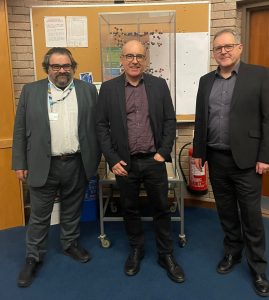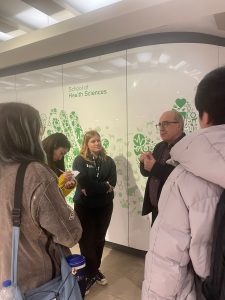March 27, 2024, by mszteh
An audience with Professor Sir Steve Jackson
On Friday 15 March 2024, staff and students across the medical faculty had the pleasure of attending ‘An audience with Professor Sir Steve Jackson’.
Hailing from Sherwood, Nottingham, the university’s honorary graduate is a senior group leader at the Cancer Research UK (CRUK) Cambridge Institute and an acting Fredrick James Quick Professor of Biology at the University of Cambridge. Conducting ground-breaking research, Professor Jackson’s Academic Research Laboratory has identified vital mechanisms by which cells respond to and repair DNA damage and helps define how their dysfunction yields cancer and other age-related diseases. His keen insights into the field have earned him numerous national and international accolades and in 2023 he was awarded a knighthood for his services to innovation and research.
Professor of Biology at the University of Cambridge. Conducting ground-breaking research, Professor Jackson’s Academic Research Laboratory has identified vital mechanisms by which cells respond to and repair DNA damage and helps define how their dysfunction yields cancer and other age-related diseases. His keen insights into the field have earned him numerous national and international accolades and in 2023 he was awarded a knighthood for his services to innovation and research.
His lecture, titled ‘DNA repair: from mechanistic insights to new medicines’, afforded medical and medically affiliated researchers and students a unique insight into Professor Jackson’s revolutionary research and the chance to learn more about his success in the pharmaceutical industry as a pioneer of innovation for life-saving drugs. Professor Jackson and his research have inspired the development of chemical compounds that interfere with DNA repair; he set up the first DNA repair drug research company KuDOS, which resulted in the creation of the first DNA repair enzyme inhibitor drug, Olaparib. This has helped to treat over 140,000 patients suffering from cancers such as breast and prostate. His company KuDOS has since gone on to be further developed by AstraZeneca.
By hearing from Professor Jackson, we, as cancer sciences students, gained clarity about the relevance of ‘Big Pharma’ in the development of drugs started by pioneer companies. Often gaining a poor reputation, Professor Jackson spoke of the major impacts large pharmaceutical companies had on KuDOS. He knew the acquisition of KuDOS was necessary to ensure more patients could receive Olaparib and that the drug would have a greater outreach, with the potential to save more lives. This development remains a meaningful outcome of his career, leaving a legacy among the cancer community.
Following his lecture, the 150 students and staff in attendance had the rare opportunity to speak with Professor Jackson and gain insights into his research and career path. One biotechnology student described this lecture as “a career maker”. The field of biotechnology is vast and presents so many opportunities and potential career pathways, as is the case for many medically affiliated disciplines, which makes choosing a postgraduate degree a challenge. Professor Jackson’s passion for DNA gave this student the clarity to choose a subject area for their biotech degree.
Additionally, Professor Jackson offered some words of wisdom for undergraduate students regarding their future studies. On the topic of cancer sciences, he mentioned that recent discoveries have expanded the breadth of knowledge in the field, meaning there is more to be learned than ever before and more discoveries await. As such, he suggested students “take their time and think carefully before pursuing a PhD, as a passion for your research niche is a key element for success in your work.”
As many other students and staff would agree, talking to Sir Steve you can’t help but feel inspired. His experiences show that there is a wide world of opportunities available through a career in drug research. His visit highlights the importance of exposing students and professionals to experienced individuals in their respective fields. This exposure allows individuals to gain valuable insights into potential career paths, as well as to network with others in their industry. Moreover, such events foster a sense of community among those interested in a particular field of study or work, creating opportunities for collaboration and knowledge sharing.
We are very grateful to Sir Steve for visiting the University of Nottingham and to all staff and students who contributed to the organisation of this event. Hopefully, we will be
offered the opportunity to hear from more field experts in the future.
Written by Alexandra Jimenez-Hope, BSc Cancer Sciences student and EDI Officer for the Oncology Society, and Tamzin Ord, BSc Cancer Sciences student and Publicity Secretary for the Oncology Society.
No comments yet, fill out a comment to be the first


Leave a Reply